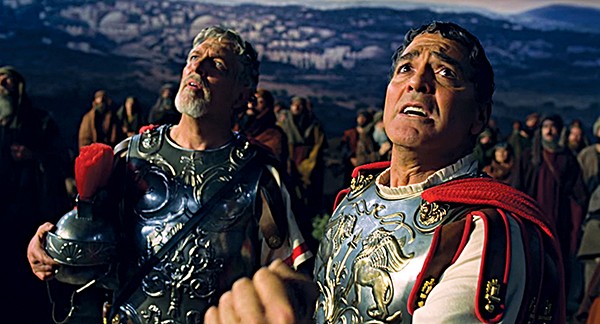Fewer Communists, more Clooney.
That’s a film critique I never thought I would offer, but here we are. Like all right-thinking Urban Achievers, I am a Coen Brothers fan—a fanatic, even. Who else has been able to create great films in so many different genres? They’ve produced two great film noirs in Miller’s Crossing and The Man Who Wasn’t There, expanded the crime genre with Fargo and the Best Picture-winning No Country for Old Men, added to the Western legacy with True Grit, and crafted some of the greatest comedies in film history with Raising Arizona and The Big Lebowski. Basically, if Joel and Ethan Coen make a movie, I’m there, no questions asked, because there’s always going to be something great onscreen. This is true even in the case of misfires like Hail, Caesar!
The strengths of their comedies have always been rooted in crackling wordplay, characterizations which walk the line between the wacky and sympathetic, and a burgeoning sense of the absurdity of life. The premise of Hail, Caesar!, an eventful day in the life of an Eisenhower-era Hollywood fixer named Eddie Mannix (Josh Brolin) seems like perfect fodder for the brothers. If you’re looking for absurdity, Hollywood presents a target-rich environment. Capitol Pictures, Mannix’s fictional studio, is a circus of stars like DeeAnna Moran (Scarlett Johansson), a squeaky-clean protagonist of water ballet pictures whose image is put at risk when she gets pregnant; Hobie Doyle (Alden Ehrenreich), the singing cowboy whose almost superhuman roping and wrangling skills are of no use when the studio thrusts him into the role of a big city swell in Laurence Laurentz’s (Ralph Feinnes) latest chamber drama; and Frances McDormand as accident-prone film editor. Best of all is George Clooney as Baird Whitlock, the epically vain actor whose kidnapping from the set of his newest sword-and-sandals flick by a group of communist screenwriters who collectively call themselves The Future provides Hail, Caesar!‘s plot momentum. Clooney, rocking the praetorian haircut like it’s 1998 on the set of ER, is loaded for bear, ready to go O Brother, Where Art Thou? big. And that’s what we all want, right? Critics like me have to pay lip service to subtle naturalism, but there’s nothing like seeing a really great actor vaulting over the top, grabbing scenery to chew. But Clooney’s efforts are largely wasted as he ends up imprisoned by the communists for much of the film while the Coens try to wring humor out of mid-century Marxist rhetoric. The basic joke is sound—the commies claim to have scientifically cracked the code of history, and yet they were unable to predict defeat by the capitalists—but the scenes meander endlessly. Clooney’s manic energy should have been at the heart of the picture, but he’s just the MacGuffin.

Let the kidnapped Clooney chew the scenery.
The Coens are operating in Lebowski mode, so the kidnapping plot is just a contrivance on which to hang the comic digressions and character moments that are the film’s real meat. The Hollywood setting allows them to try on different genres every few minutes, such as Channing Tatum’s gay sailor musical number “No Dames,” but too often it comes off as empty riffing. The Coen’s clockwork timing seems broken.
I personally enjoyed Hail Caesar!, but I cannot recommend it to anyone outside the Coen cult. It is their least funny film since The Ladykillers in 2004, but, to be fair, the last decade has seen the brothers occupied with existential dramas like 2009’s A Serious Man. Roger Deakins’ photography is, of course, first rate, and the production design is off the charts good. In a way, Hail, Cesar! reminds me of a mid-period Woody Allen picture, expertly crafted but lacking a certain energy. And consider this: When The Big Lebowski was released in 1998, it was considered a disappointment after the universally hailed Fargo, but time was good to the Dude, and it is now rightly ranked as one of the greatest comedies ever made. Considering the majesty of the Coen’s True Grit remake and the crackerjack work they did on the screenplay for Stephen Spielberg’s Bridge of Spies, maybe the days of the gonzo Coen comedy are over, and the brothers should stay serious.